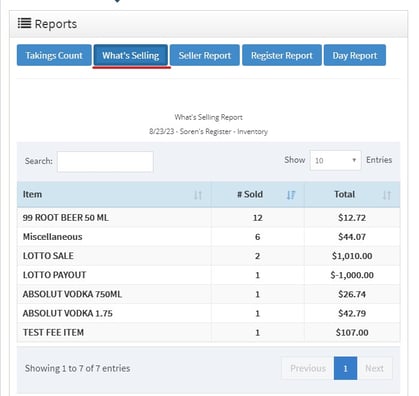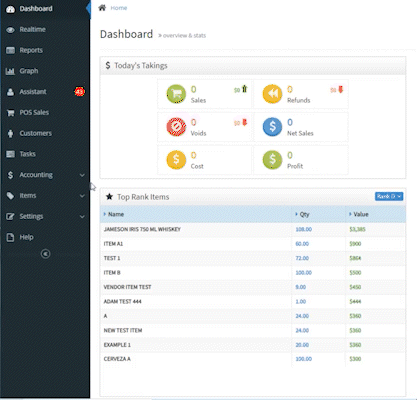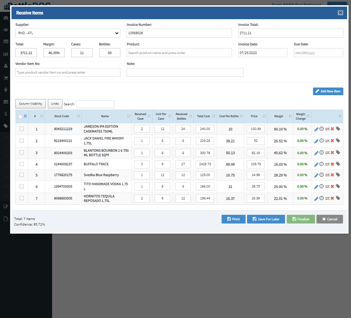5 Wine Marketing Ideas To Try Today
Are you making the most of your liquor store data?
Imagine this: it’s closing time on a Sunday. You wrap up another busy week — calculating total sales, paying your employees, and taking a quick glance at your inventory. You can’t help but think you could be doing more… Looking deeper into sales trends, monitoring employee performance, and improving inventory management.
But where do you start?
This article highlights how you can make the most of liquor store analytics and reporting. We’ll tell you the metrics you should track and manage so you can improve your bottom line and start pouring on the rewards.
You can’t just rely on gut feeling and shallow metrics when it comes to managing your liquor store. You might be doing OK, but is that enough? If you want your liquor store to thrive, you need to lean on data.
Making data-driven decisions could take your store from mediocre to great.
By tracking the right metrics, you can improve sales, see what’s working well, what needs improvement, and where there are gaps and opportunities. And it doesn’t have to be all-consuming! You won’t need to stare at reports into the early hours — there are tools that make reporting easy.
One such tool is a liquor store point of sale (POS) system. It’s a goldmine of relevant data.
With features like automatic inventory tracking, sales reporting, and customer management, a POS system is the perfect tool to help you manage and grow your business.
Let’s dig into the metrics that matter.
It’s a delicate balancing act — knowing what to stock and what to discontinue.
Without a deep dive into your sales data, you might rely on memory. Perhaps a certain whisky has always sold well, so you order more. What if it doesn’t sell well anymore? What if your customers’ tastes change?
You won’t know unless you explore your sales reports. With more data, you can make better decisions.
For example, if a specific brand of rum is selling well, you can confidently order more and even feature it in your displays. On the other hand, if a specific product isn’t selling well, you can cut your losses and discontinue that item.
Feature highlight: Bottle POS software automatically grades your items on an A-B-C-D scale and color codes them based on sale patterns. This report is an easy way to see which brands drive your sales. Other critical reports include day reports, sales reports, and item not found reports.

You can also use historical sales reports to see when your busiest times are and make informed decisions about staffing, inventory, and more. For example, if your liquor store is busiest on Friday nights, make sure you have plenty of staff on hand.
Look for reports like sales trends over time, broken down by day, hour, or even minute.
Sales figures only tell part of the story. You also need to look at profit margins. How much money are you making on each sale? Tracking profit margins shows which products are most profitable for your store and helps you price and promote them.
A liquor store POS system should let you track sales and profits for each item in your inventory and generate detailed reports.
Related Read: Is Your Liquor Store Profitable? 5 Things You Should Fix
Simply put, the inventory turnover rate tells you how quickly you’re selling through your stock and replacing it with new inventory. You want to find the sweet spot between:
In other words — not too fast, not too slow.
Related Read: How to Increase Inventory Turnover: 6 Ways to Optimize Your Inventory
How can you track inventory turnover rates? Once again, a liquor store POS system more than does the job. Use real-time inventory tracking to see what you have in stock at any given time. You can then quickly spot when items are running low and need to be reordered.
Feature highlight: Bottle POS software automatically generates purchase orders. The software detects when stock levels dip below a certain threshold and generates a purchase order for that item.
Getting to know your customers is essential to providing the products they want.
You can track what each customer buys and get insights into their preferences, habits, and behaviors. Using these insights informs marketing strategies and how you communicate with customers.
Think about it this way: If you know one of your customers always buys a specific brand of vodka every two weeks, in the days before they come in, you could create a targeted promotion or personalized recommendation for that customer. Other things you can track:
How can you track customer purchase history? Using your POS system! Modern POS systems offer customer profile management capabilities that create detailed records for each individual customer, including their purchase history, contact information, and other relevant details.
You can use customer purchase histories and other details to start a liquor loyalty program. Loyalty programs are a great way to incentivize repeat business and reward your most valuable customers.
Feature highlight: Bottle POS has customer loyalty features baked in. You can set up a rewards program that incentivizes repeat purchases, like a point system that can be redeemed for discounts, free items, or custom deals.

Your suppliers are critical partners in your business. To keep your shelves stocked and customers satisfied, you need a way to ensure timely, accurate deliveries — and tracking supplier performance is crucial to finding the right partners.
For example, let's say you have two different suppliers for your store's craft beer selection. Supplier A consistently delivers orders on time and with high accuracy, while Supplier B is often late and has a higher rate of incorrect or incomplete orders.
Related Read: The 5 Top Vendor Management Best Practices
Tracking these metrics over time clearly shows that Supplier A is more reliable and efficient. Also, the more you order from this supplier, the stronger your relationship will be. Once you establish this relationship, you can negotiate better shipping rates, unit pricing, and volume discounts.
Use your liquor store POS system to track supplier performance:
Feature highlight: To close the inventory loop, when stock arrives at your store, Bottle POS automatically imports an invoice, so you just have to review and finalize it.

By tracking key metrics like sales, profit margins, inventory turnover, customer behavior, peak hours, supplier performance, and more, you can find gaps and opportunities for growth. But without action, they’re just numbers on a machine.
To make the most of liquor store analytics and reporting, you have to use what you uncover to make purchasing, promotional, and operational decisions for your liquor store. But, implementing a data-driven approach isn’t easy — unless you have the right tools.
Bottle POS provides liquor store owners with an industry-specific POS system that comes with custom reports, supplier management, customer loyalty features, inventory control, and more.
To see it in action, schedule a demo with our liquor experts today, or use our free build and price tool to build your own POS system.

.png?width=264&height=280&name=transparent%20(1).png)

